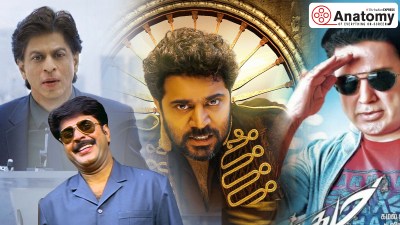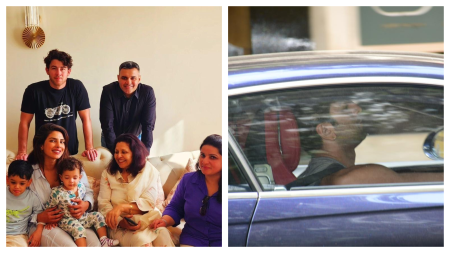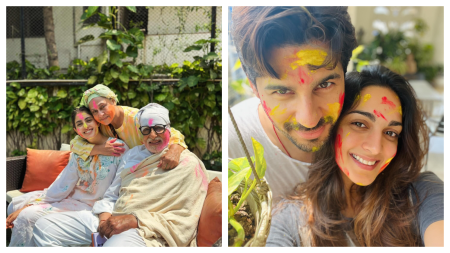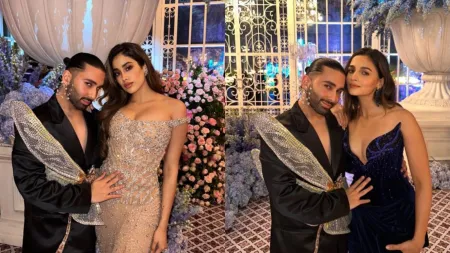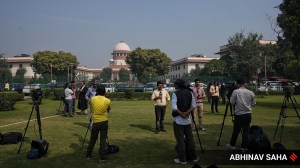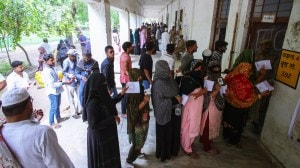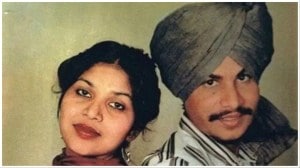- India
- International
I wanted Baaram to be dark and intense: Priya Krishnaswamy
National Award-winning director Priya Krishnaswamy discusses Baaram, and her approach towards filmmaking.
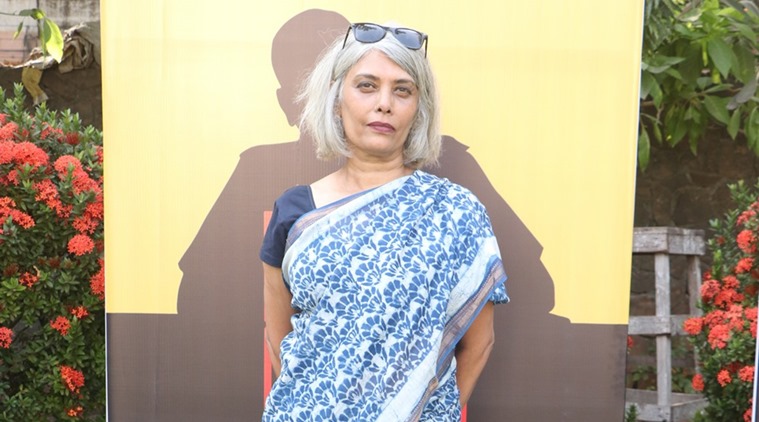 The National Award winning film Baaram, helmed by Priya Krishnaswamy, released in theatres today.
The National Award winning film Baaram, helmed by Priya Krishnaswamy, released in theatres today.
Priya Krishnaswamy’s profile on Twitter describes her the best—filmmaker without borders. She has written, edited, directed and produced Baaram, which won the National Award for Best Feature Film in Tamil last year. The 91-minute film deals with ‘Thalaikoothal’ that refers to the practice of killing the elders in the family when they become a ‘burden’. In a freewheeling chat, Priya Krishnaswamy speaks about a wide range of topics, besides Baaram, which is releasing today.
Excerpts from a conversation:
Though you have been honoured twice with the National Award, they think you are an ‘outsider’.
I have been an outsider all my life… even in Mumbai! 32 years and still counting. I am not Hindi speaking. I am not a Marathi, but I married a Kashmiri. These tags don’t bother me. I have travelled extensively, far and wide that I feel that I belong to nowhere. (Pauses) Or do I say I belong everywhere? I am more of a storyteller than a writer. A filmmaker should belong to a tribe of people—that’s most important of all. Despite the differences, we accept each other all the time. Don’t we? (Smiles)
I am sure. Tell us more about Baaram.
I wrote Baaram in two weeks. We shot the film in 18 days. I first got to know of ‘Thalaikoothal’ aka forced senicide in 2012 via news websites. The more I researched, the more it disturbed me. I realised thousands of villagers were killed by their own families in the interiors of Tamil Nadu every year. After three years of research, I visited a small town. I met a 55-year-old trade union leader, whose uncle had died suddenly following a hip fracture. He told me what had happened, and it was insanely horrifying. I was raised by my grandparents, and the idea of the head bath is connected with memories of Deepavali-related rituals rather than murder. I wanted to tell a story straight from the heart. What began as an idea in my head was poured on to pages of paper and took a form, finally.
Since Baaram deals with a sensitive subject, did you stick to the tone of a docu-drama?

Baaram needed such treatment. Otherwise, it wouldn’t have created an emotional impact. It was a conscious choice that I wanted Baaram to be dark and intense. All I attempted was to make a film about Thalaikoothal. I wanted to generate noise and visibility. It is challenging to get people to talk to a filmmaker. It’s tricky. I could have made the same film in Hindi, but I didn’t get investors. I am a Tamilian, and I know the language well. So I thought, why not I make Baaram in Tamil.
Baaram was premiered in several film festivals. Are you confident that it will do commercially well in theaters?
That’s the intention of making a film, right? We thought we would like to release it, but the question was ‘how’. I barely had the money to make it, but who will release the film? I am glad I met director Ram, who put me on to Vetrimaaran. It was about meeting the right people at the right time in the right place. We planned to send it to the festivals right from the start, and this created a buzz about the film. I want everyone to see Baaram. I made the film to reach people, after all. I request the audience to come to theaters with an open mind and encourage a small film.
Baaram is a drama based on true events, but you did not have disclaimers in the beginning.
I have always had a very personal relationship with films. Apart from the fact that the story is moving, we are on the verge of an ageing population explosion. I was trying to do justice to the story. Killing people can never be a solution, and I wanted to put this message out. That’s why I didn’t make a documentary on the subject. I went ahead with a feature film because I knew it would reach the masses. Would you believe if I say ‘Thalaikoothal’ is prevalent in the place we shot Baaram?
It’s unbelievable. How did you go about casting the actors?
Since I knew nobody in Tamil Nadu, I had to approach a casting agent. Once I cast Raju (who played Karuppasamy), everything fell into place. We shot in Puducherry. Also, we had a 15-day acting workshop with the non-professional actors, which played to the film’s advantage.
Take me through your writing process.
We don’t invest in writers. (Sighs) I am not a great writer, but I think in English and dream in English! (Laughs) The concept of Baaram got me excited. Since I researched a lot, I had a rooted understanding of the story I was going to tell. Oh, yes, it affected me.
Did you face writer’s block? If so, how did you overcome it?
Every evening, I go on a walk for an hour. I think during that time. The next day, it becomes easy when I sit down to write after Yoga. I made mistakes. But, I tried. More than the emotional integrity of the story, I wanted the logic to be right. As for Baaram, I wanted to keep everything realistic. I didn’t want to have too many subplots. There would have been breathing space if I had a few, but I didn’t want them. For example, a scene would not have materialised the way I wanted. After trying thrice, I chose to go ahead with it. I had no choice. I am human. I had bad days, and we were pushing mad. I didn’t want to approach renowned actors. Because, once they come in, it becomes their’ project. It means I have to rework everything once again. I wanted to give the best with whatever resources I had.
How did you enjoy the editing process?
As an editor, sometimes, you need to be ruthless, and I find it difficult. I edited Gangoobai, the first feature film I made, much like Baaram. When I did the first edit, there was zero focus. Everything seemed important. My daughter Ardra Swaroop (also the co-producer) saw the footage, and she didn’t like it. I had to re-edit. I incorporated some of the techniques I had learnt from watching The Imposter, a 2012 British-American documentary film. For instance, how I framed the shots of the main characters.
Is the final product the same as what you originally envisioned?
I wanted to make it shorter! (Grins) We were making Baaram on a shoestring budget. Of course, what we shot was different from what I scripted. The reporter had a separate character arc in the second half. We had to chop her portions, too. There was a story behind Karuppasamy and the pup we showed for a few seconds. We couldn’t accommodate many things because of logistics. Additionally, there would have been space for half-an-hour material. At the same time, I didn’t want to end up showing a love track between the reporter and Veera (Karuppasamy’s nephew), okay? (Laughs) I have no regrets though. I knew there were going to be changes. I was prepared for it.
Did you expect the film would get the National Award?
Are you kidding me? (Laughs) Absolutely not! Baaram was competing with some of the finest entries including Pariyerum Perumal, Vada Chennai and Peranbu. I was rooting for Peranbu, but, unfortunately, it didn’t win. Had I not met Ram at IFFI, Baaram would not have been what it is today. Being in Chennai, he helped with my interviews in Mumbai! That’s the heart of the man. In 2016, I had come to Chennai as I wanted to approach Vetrimaaran, but it didn’t happen. Again, I got to meet him through Ram when Vetrimaaran was working on Asuran. That’s the destiny of Baaram.
What kinds of films do you like to direct?
I don’t like to categorise cinema, but I am an avid movie buff. In Mumbai, there’s a PVR down the road, and I watch most of the films there. I drive inspiration from life. All films are commercial, irrespective of the scale of a project. I believe every single film has a market, and only the budget has to be controlled. Films don’t fail, whereas budgets do. With the arrival of these digital players into the market, the distribution business has become a nightmare—that’s the only thing I am scared of.
We have many ‘women-oriented’ films, but there are only a few women filmmakers around.
Let’s get this straight—I chose to work in a male chauvinistic industry and let me deal with it. This is my life. There have been technicians in the north, who tried to take advantage of me simply because I am a woman. They wouldn’t dare talk to a man in such a way. How others treat me is beyond my control, but how I react to situations is in my hands. I would say the Tamil industry is nicer and more professional. Also, I can relate to films that Vetrimaaran, Ram, Mysskin and Raju Murugan make. I am a big fan of Sean Roldan, too. His music is divine. Once every two months, I make it a point to listen to the Joker songs.
What’s next?
I am working on a martial arts feature film based on Unniarcha, a Kalari warrior who lived in Kerala.
Photos
Apr 26: Latest News
- 01
- 02
- 03
- 04
- 05











